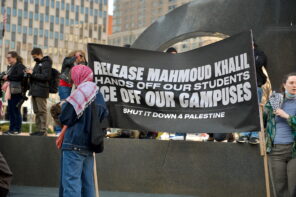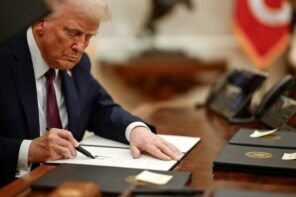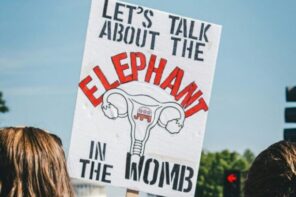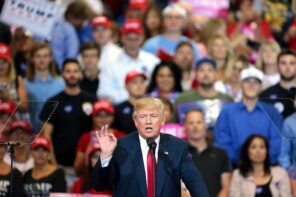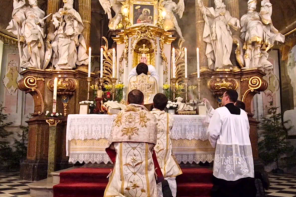By now you’ve read about Hamas’s attack and Israel’s ferocious response, all of which has exposed deep divisions on the Right, and aroused Christian Zionist supporters, but what are the implications of a violent, percussive war in the Middle East for domestic American politics? The impacts will only be heightened as we’ve entered a political season that had already promised to be—even without war in Ukraine and now in the so-called Holy Land—an unholy shit show. But the outbreak of violent struggle in Israel and the Occupied Territories has the potential to favor Donald Trump, the Republican Party, and the authoritarian Christian nationalism we’ve seen the United States increasingly bend toward.
A recent pro-Palestinian rally in New York organized by the Democratic Socialists of America disclosed political fault lines within New York’s Democratic coalition that, according to the Times, “underscored how deeply the seemingly faraway conflict in Israel resonates in even the most local of political battles, in a city home to more Jews than any other in the world.” The Times piece makes the point for me: No religious war is local. All religious wars are local. The underlying religious dynamics of the Hamas attack on Israel are instantly reverberating in the United States.
What I’ll say up front is that the moral lens to which politicians and pundits alike have instantly retreated—as if to a bunker—is less than worthless. To reduce commentary and analysis to the “self-evident” notion that the Hamas attack is all about “evil” (by definition) attacking “good” (because what else does “evil” do?) tells us nothing while concealing everything. Let’s use the notion of quantum entanglement to disentangle ourselves from this unhelpful and counterproductive framing.
Quantum entanglement occurs when the properties of two or more particles correlate even when separated by large distances. The state of one particle instantaneously influences the states of the other entangled particles—faster than even the speed of light could transmit the information. Einstein famously described quantum entanglement as “spooky action at a distance.”
Quantum entanglement evades the standard cause-and-effect model that’s so critical to classical physics, but it is about correlation. The phrase correlation is not causation generally refers to the problem of overdetermination—one thing may be connected to another but doesn’t necessarily occur because of the other. Correlation implies many causes for a single outcome, which makes it difficult to establish clear causal lines. Quantum entanglement is different—it implies no causes for the parallel behavior of particles across spacetime. Which is what makes it “spooky.”
Likewise, within complex cultures and societies, strict causation models tend to break down or prove unreliable. Far more often than we’d like to believe, correlation is actually our only basis for framing and understanding human behavior. Which poses a problem for classical explanatory models of politics. But it also creates an opportunity for quantum explanatory models, if only metaphorically, by helping us to imagine the significance of parallel, correlated social phenomena occurring at a distance, but nearly in real time, within hyperlocal settings.
To take an example from the current situation, a causation model alone might predict effects from a Middle Eastern war that would help elect Trump. I am not proposing such a model. What I’m suggesting instead is that correlations exist between the political and religious situation in the Unholy Land and the political and religious situation in the Disunited States of America.
Other correlations of this sort exist throughout the world. They are a product of the Great Dis-Ordering of global relationships since the end of the Cold War, which have reproduced and spread as we’ve transitioned from a stable world order governed largely by the United States to a multi-polar world governed by… no one.
Hyperlocal affinities
Let’s consider a profound irony. A spate of publications, including this one, have for some time observed a global decline of organized religiosity—a fascinating development, for sure. In the past 10 or 15 years, rates of unbelievers or those unaffiliated with any organized religion or any superimposing deity have more than doubled.
But that’s not the irony. The irony—which also seems to be eluding most pundits—is that, despite the historically low percentage of people with religious conviction, the influence of religious conservatives may well be at an all-time high. We see this in Israel and in the United States (Russia too, for that matter). In my lists of saved news stories, for instance, articles about the decline of religiosity exist side by side with articles about how a reactionary Supreme Court has elevated “religious freedom” above all other freedoms and rights, about how the Right is turning religion into identity.
This paradox exists around the world, representing a turning-inward, rather than a turning-toward—a fractal roughening of the landscape of politics, which has become more local, more contested, more fraught, more violent, more paranoid, and more primitive as global institutions have broken down. We can see this fracturing today in the Republican Party of the United States, as its most extreme members dig in and chip away at coalitions and partnerships that once provided a foundation for governing. No such foundation remains.
In Israel, over half of the ultra-Orthodox Jewish population lives in just four cities: Jerusalem, Bnei Brak, Ashdod and Elad. We’re well aware of the self-sorting in the United States in recent decades, a phenomenon that has itself sharpened identities (along with identity politics) and curved geographies in on themselves. Let’s call this turning-inward a version of hyperlocalism, the politics of which produce and reinforce affinities—not with contiguous neighborhoods, settlements and regions, but with other hyperlocal geographies around the world.
The tendency of hyperlocal geographies is to dis-integrate socially; to devolve emotionally and psychologically; to regress into fear-based and resentment-based identities; to retreat into tradition; to dismiss the value and promise of education, learning, novelty, and adventure; to bunker down; to lash out; to resolve identity into territory; and to transform difference into enmity.
Via social media, support for Israel—and for the ultra-Orthodox and religious nationalist factions that govern the nation—has plausibly activated and excited mirror neurons among religious conservatives in the United States, particularly among Protestant evangelicals—many of whom anticipate that conflict in the Holy Land presages the end times and the return of Jesus—but also among conservative and traditionalist Catholics who stand upon the ramparts of natural law morality.
Of course, we expect Christian nationalists and evangelicals in the United States generally to rally around the cause of Israeli religious nationalists and to sharpen their anti-modernist critique of secular, cosmopolitan elites (even if a segment of the U.S. Right disagrees). If the religious war in Israel and the Palestinian territories tips the balance in favor of Trump and the Republicans, it will result from this nearly cellular identification of religious conservatives in key battleground states with their counterparts in Israel.
But the connections will be based on correlation, not causation. They will be entangled hyperlocally in what amounts to “a spooky action at a distance.” The texture of politics has changed in our lifetimes. What human societies have witnessed since the end of the Cold War has been a gradual dis-integration that concentrates energy and emotion within regressively more provincial and primitive (but correspondingly more intense and rooted) local identities.
The dis-integration of the connective tissues of the global regime held up by the United States and by multilateral, multinational political, and economic institutions since the end of World War II—and particularly since the end of the Cold War and the advent of neoliberalism—have corresponded to an aggressive proliferation of hyperlocal geographies.
We need not presume some active communication or connection between these hyperlocal geographies to conceptualize a contagion of reaction. But the probabilities do change. We now live in a fully fractal world, in which the availability of sharp-edged nodes of resistance and reaction at local and regional levels have tilted the world dramatically toward a cycle of decline. They’re like the pebbles in a gathering landslide.
None of this guarantees Trump and Republicans will reclaim power in 2024. The possibility is still best classified as a strong maybe. But the map of hyperlocalism is blinking red around the world. And to the extent that events—such as this new war in the Middle East—inflame the texture of these relationships and multiply and intensify their presence, the probabilities will inexorably shift from maybe to likely.
